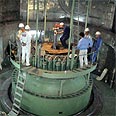
U.S. military intervention needed, Pinkas says
צילום: רויטרס
Should we bomb Iran?
Israeli military blow would not annihilate Iran’s nuclear capability
We can talk and fantasize about annihilating Iran’s nuclear capability with one bold IDF thrust, similar to the destruction of Iraq’s nuclear reactor in 1981. The truth is that it is much more complicated, perhaps even impossible.
As opposed to the Iraqi nuclear reactor, the Iranian nuclear program is decentralized, departmentalized, underground and clandestine.
The U.S. and Israel believe efforts, including the European initiative to link economic incentives with the eradication of Iran’s nuclear program and the U.S.’s threats of sanctions, to prevent Iran from stockpiling nuclear weapons, will prove futile.
In other words, Iran will hold nuclear weapons within three to seven years (according to intelligence estimates).
Furthermore, Iran has a national and strategic interest in becoming a nuclear force, and even the collapse of the ayatollahs' regime would not change this.
If Iran has made "good" use of the information and material it had apparently purchased from the “father of the Pakistani bomb,” it may currently possess material for the creation of some 20 nuclear bombs. Without significant interference, the uranium enrichment will continue until a bomb is built and ready for launching on a Shihab-3 missile.
Israel would then have to entirely rethink the nature of its deterrence.
The significance of Mahmoud Ahmadinejad’s election cannot be determined as of yet. Some say Iran’s shift toward a more radical and extremist direction would actually facilitate democratization and eventually result in the toppling of the ayatollahs within a few years.
High price of oil good for Iran
According to Stanford University in California, the best-selling book in Tehran these days is the bootleg edition of Bill Clinton’s “My Life.”
Modern-day Iranians hate Israel and the Bush administration, but there is also growing generational disappointment from the Islamic revolution, which has failed in every aspect and has not lived up to any of its promises.
The problem is that it is difficult to translate subversive currents in Iranian society into efficient pressure on the regime to halt the nuclear project.
The election of an extremist president should make it easy for U.S. President George W. Bush to claim at the G-8 summit in Scotland that the European diplomatic initiative, which is based on tempting Iran with numerous incentives, is not working.
Tehran has an incentive not to succumb to economic pressure: The high price of oil is good for the Iranian economy, and the regime has a clear interest in defying the West, as long as Russia does not stand by Washington’s side. Perhaps it is time for the stick, but the war in Iraq is depriving Bush of his ability to maneuver against Iran.
Political damage
So how should Israel act? In 2000 an Israeli-American Strategic Policy Planning Group discussed the option of forming a “defense alliance” between the countries.
One of the issues examined at the time was the importing of cruise missiles to Israel. During one of the preliminary deliberations in Israel, a senior American official who supported the establishment of an alliance said to his Israeli counterparts, “It is evident to us why you are interested in the ‘Tomahawk’ missiles; Syria is definitely not reason enough - you believe it will add to your deterrence against Iran.”
This is not the sole reason, Israel said at the time.
“This position is not a realistic one,” the American official replied. “Iran is not 1980’s Iraq, and in any case you will never be permitted to use this weapon without American authorization. If a “defense alliance” were to exist, an immediate Iranian threat would mean that the U.S., and not Israel, would apply military force against Iran.”
“Furthermore,” the American added, “our intelligence sources say that an Israeli attack on Iran would not necessarily be effective, and it is almost certain such an attack would not produce a decisive outcome. The political damage from such an attack would undoubtedly outweigh its military effectiveness.”
One can be skeptical of these intelligence reports, as three years later the U.S erroneously convinced itself that Iraq possessed weapons of mass destruction that threaten the world.
But it remains highly unlikely that the American assessment regarding the effectiveness of a military blow against Iran has significantly changed.
If anything, the failure in Iraq has only strengthened the claim.
Politically-speaking, Israel adopted the American position: its policy revolves around the claim that the Iranian nuclear threat is not Israel’s concern alone - it is a real danger to the region and the entire free world.
The thing is, Iran may eventually realize its nuclear aspirations without mass U.S military intervention, but this sort of intervention is not probable.










